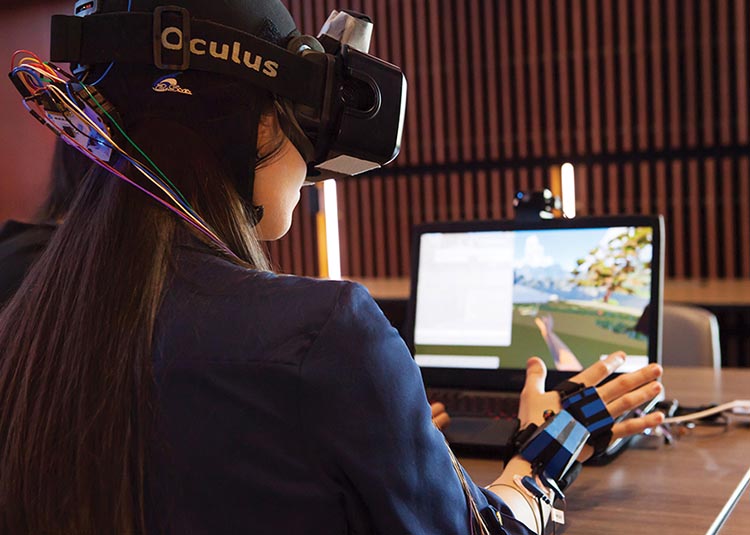Virtual reality research team earns USC Collaboration Fund grant
June 20, 2019
The interdisciplinary endeavor aims to establish USC as a world leader in the use of virtual technologies for healthcare.
Awards Community and Partners Faculty Research Technology
By John Hobbs
Move over, gamers. There are some new players in the world of virtual and augmented reality (VR/AR).
Increasingly, healthcare providers are looking to the immersive nature of VR as a way to treat a myriad of conditions. In fact, the market for virtual reality-based healthcare is expected to hit nearly $4 billion globally by 2020.
A multidisciplinary group of Trojan researchers aims to put USC at the forefront of this growing field, with help from a new grant they recently received from the USC Collaboration Fund.
The Sensorimotor Assessment and Rehabilitation Training in Virtual Reality (SMART-VR) Center is led by a team of world-class investigators across the fields of occupational therapy, biokinesiology, computer science, engineering, neuroscience, cinema, business and gerontology — six USC schools and nine departments, in total — that studies and develops VR/AR interventions for healthcare.
All hands on deck
“Our vision is for the SMART-VR Center to serve as a hub for everything from linking developers to potential clinical collaborators, providing an evidence base for the design and evaluation of VR-based interventions and helping USC-based developers access the resources necessary to get their applications into the hands of patients and clinicians,” said James Finley, SMART-VR Center co-director and assistant professor at the USC Division of Biokinesiology and Physical Therapy.
SMART-VR Center was established in 2018, thanks to a one-year seed grant awarded by the USC Division of Biokinesiology and Physical Therapy.
During its first year, the SMART-VR Center set out to develop an infrastructure to facilitate cross-campus collaborations, speed up development of health-related VR prototypes and host the first university-wide symposium for Virtual Technologies for Health, which took place in late September 2018.
Healing headset
Some of the projects currently taking place through the SMART-VR Center include helping stroke survivors learn to reuse their arms with a brain-machine interface, improving walking ability in stroke survivors and those who have Parkinson’s disease, strengthening cognition using virtual reality-based exercise programs in those diagnosed with or at risk for Alzheimer’s disease and helping patients with post-traumatic stress disorder overcome their fears (flying, heights, public speaking and spiders).
“Each member of the SMART-VR team has a different focus, but I see the center as something that can facilitate all our interests from basic science to clinical app development/evaluation to perhaps weighing in on standards and guidelines for future development,” said Albert “Skip” Rizzo, co-principal investigator, professor at the USC Leonard Davis School of Gerontology and world-renowned expert in the medical use of VR.
“The exciting thing is that everyone is passionate about improving healthcare through VR/AR technologies, even though their perspective and expertise may differ,” said Sook-Lei Liew MA ’08, PhD ’12, the SMART-VR Center’s lead principal investigator.
A complete VR ecosystem
With the new grant, the USC SMART-VR Center aims to expand its reach across the university, provide educational opportunities with hackathons and workshops and hold the second annual USC Virtual Technologies for Health Symposium.
In addition to the USC Collaboration Fund grant, it will also leverage support from the USC Chan Division of Occupational Science and Occupational Therapy, whose strategic plan prioritizes innovative technologies that will improve healthcare.
“We aim to be a complete ecosystem for VR researchers, educators and clinicians, and to make USC a leader in driving forward scientifically rigorous and clinically impactful VR and AR applications,” said Liew, who is also an assistant professor with appointments at USC Chan, the USC Division of Biokinesiology and Physical Therapy, Keck School of Medicine of USC’s Department of Neurology, the USC Viterbi School of Engineering and the Stevens Neuorimaging and Informatics Institute.
⋯
Next by tag Awards ⟩ Community and Partners ⟩ Faculty ⟩ Research ⟩ Technology ⟩






